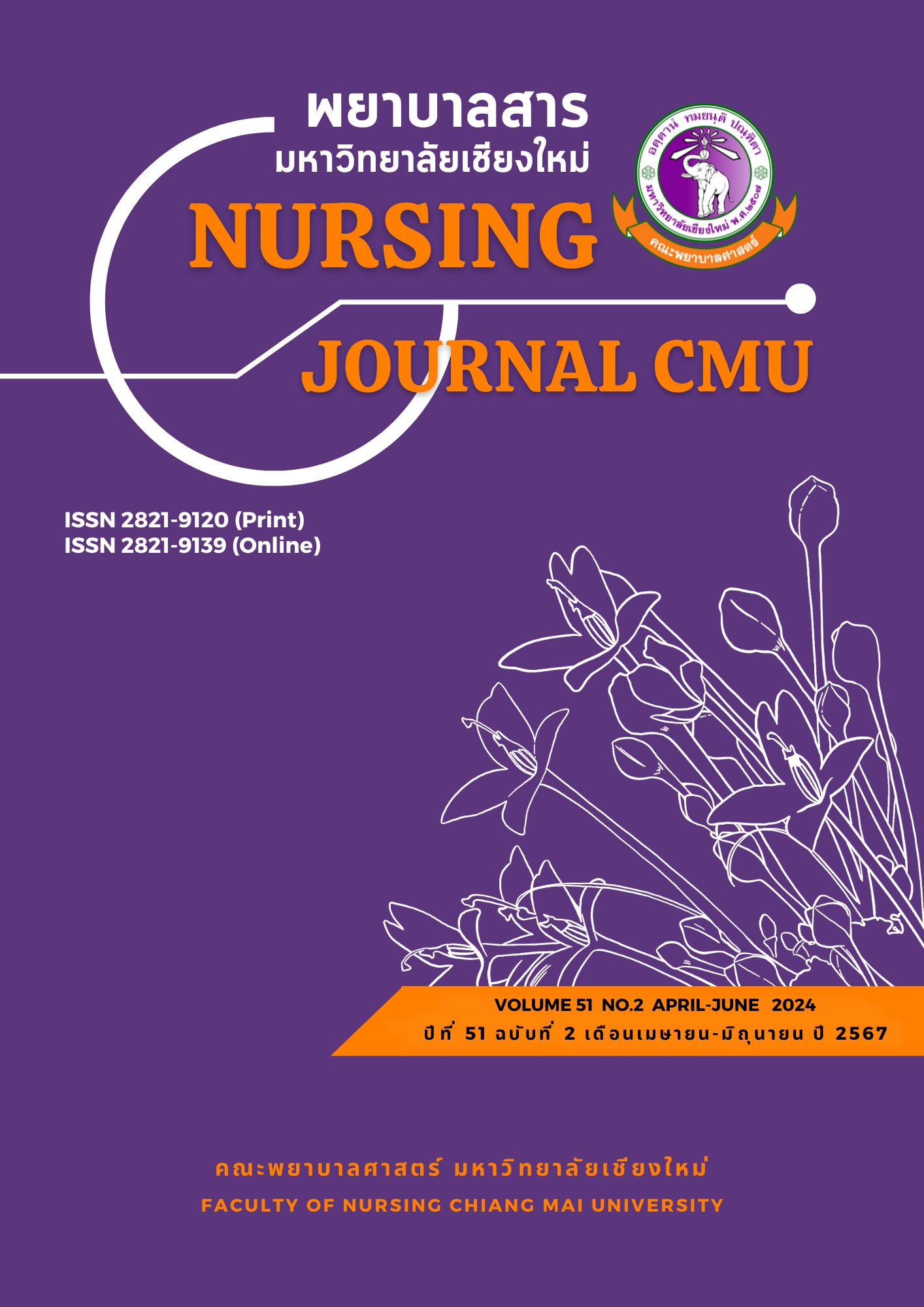Perceived Competency Focusing on Program Learning Outcomes, Supporting Factors, and Obstacles Related to Competency Development of Nursing Students in the Bachelor of Nursing Science Curriculum
Keywords:
Learning outcomes, Perception, Competency, Nursing studentsAbstract
Perceived competency as a learning outcome of the Bachelor of Nursing Science Curriculum (Revised Edition 2016) at the Faculty of Nursing, Naresuan University, was the focus of this study which aimed to examine the self-perceived competencies of nursing students, including supporting factors and obstacles facing the students in gaining these competencies. The participants comprised 107 nursing students who completed their studies in the academic year 2023. A questionnaire was used for data collection on these perceived competencies, focusing on program learning outcomes. The questionnaire attained a content validity index of .99, and Cronbach’s alpha coefficient was .92. The focus group discussion was conducted with 12 participants. Descriptive statistics for quantitative data and content analysis for qualitative data were used.
The results revealed that the overall competency of participants was at a high level (M = 4.27, SD = 0.61). All aspects were high: the highest mean score was for ethics and morals (M = 4.44, SD = 0.57), followed by professional practice skills (M = 4.39, SD = 0.61), interpersonal skills and responsibility (M = 4.32, SD = 0.62), cognitive skills (M = 4.19, SD = 0.63), knowledge (M = 4.17, SD = 0.61), numerical analysis, and communication and information technology skills (M = 4.11, SD = 0.66). Supporting factors related to competency were 1) instructional designs and nursing teachers’ characteristics, 2) teaching methods, 3) intention of nursing students, 4) encouragement, and 5) learning environment. The barrier related to competency of participants was tiredness.
These findings provide baseline information for planning, curriculum development, and teaching design to better enhance nursing students’ competencies.
References
Artin-in, S. (2020). Science and art, learning in the 21st century (3rd ed.). KKU printing house. (in Thai)
Chantra, R., Thongphet, P., & Sornkshetrin, A. (2016). Factors related the ideal characteristics of Thai graduates according to Thailand qualification framework for higher education (TQF: HEd) the nursing student of Boromarajonani College of Nursing, Surat Thani. Journal of Nursing Education, 9(4), 90-101. (in Thai)
Faculty of Nursing, Naresuan University. (2016). Bachelor of Nursing Science Program Curriculum (Revised 2016). http://www.nurse.nu.ac.th/add/Bachelor_59.pdf (in Thai)
Hirunchunha, S., Boonkong, S., Phumdoung, S., Bookyoung, N., & Sangchan, H. (2021). Lifelong learning competency of nursing students, supporting and obstacle factors related to lifelong learning competency development. Songklanagarind Journal of Nursing, 41(4), 38-49. (in Thai)
Khumyu, A., Chupan, S., Puttaruksa, L., Rattanajarana, S., Songaiad, D., & Chunchomgul, C. (2021). Factors related to professional nursing competency among nursing students at a university in the Eastern region. The Journal of Faculty of Nursing Burapha University, 29(1), 1-12. (in Thai)
Kruttakart, S., Chiwut, P., Rungnoei, N., Wichianrat, S., & Wanngamwiset, S. (2023). Factors of learning behaviors and environments in the Nursing College affected on the perception of learning outcomes according to Thailand qualification framework for higher education of nursing students in Boromarajonani College of Nursing, Nonthaburi Province. Journal of Nursing and Health Science Research, 15(2), e261426. https://nursing.iserl.org/bcnsurat/index.php/researcher/profile/rs_popup/6626 (in Thai)
Lincoln, Y. S., & Guba, E. G. (1985). Naturalistic inquiry. Sage.
Miller, W. L., & Crabtree, B. F. (1992). Primary care research: A multimethod typology and qualitative road map. In B. F. Crabtree & W. L. Miller (Eds.), Doing qualitative research. Sage.
Ministry of Education. (2009). Announcement of the Ministry of Education on Thai qualifications framework for higher education, 2009. Government gazette. (in Thai)
Office of the Education Council. (2019). Understanding competencies easily for People and understanding competency-based curriculum easily for teachers, administrators, and educational personnel (revised edition). 21 century. http://www.onec.go.th/th.php/book/BookView/1661 (in Thai)
Petchkong, J. (2016). Causal factors affecting to learning outcomes of nursing students: Boromarajonani College of Nursing Chakriraj. EAU Heritage Journal Science and Technology, 10(2), 199-211. (in Thai)
Pipatmongkonporn, I. (2019). Classroom management strategies. Journal of Education, Silpakorn University, 17(1), 71-82. https://so02.tci-thaijo.org/index.php/suedujournal/article/view/210309/145537 (in Thai)
Pungsawang, N., & Booncharoenpanich, S. (2017). The quality of graduates according to Thai qualify-cations framework for higher education and desirable characteristics according to Royal Thai Air Force Nursing College. Royal Thai Medical Journal, 44(2), 1-17. (in Thai)
Sangprateeptong, V. (2018). Guidelines for assessment of learning outcomes in the 21st century. Udon Ratchathani Journal of Research and Evaluation, 7(1), 1-10. (in Thai)
Songwatthanayuth, P., Kitsawat, S., Sirichot, K., & Boonlua, B. (2019). Factors related the characteristics of graduates framework for higher education among nursing student in Prachomklao College of Nursing, Phetchaburi Province. Journal of Prachomklao College of Nursing, Phetchaburi Province, 1(1), 57-69. (in Thai)
Srisaard, B. (2017). Introduction to research (10th ed.). Suveeriyasarn. (in Thai)
Sukcharoen, P. (2018). The perspectives of motivation in education of the nursing students. Christian University of Thailand Journal, 24(1), 116-124. (in Thai)
Suwannakeeree, W., Suwannaosoa, S., Chairat, R., Chaiem, O., & Tongsaard, T. (2019). Exploring 21st century learning skills of nursing students, Naresuan University. Journal of Nursing Sciences, 13(1), 89-98. (in Thai)
Talerd, W., & Surathaworn, R. (2022). A comparative study of perceived self-competencies in application of the nursing process and self-directed learning among nursing students. Journal of Boromarajonani College of Nursing, Surin, 12(1), 94-108. (in Thai)
Thailand Nursing and Midwifery Council. (2024). Council regulation for approve the nursing and midwifery education curriculum. https://www.tnmc.or.th/images/userfiles/files/BNS_.pdf (in Thai)
Wangruangsatid, R., & Kaewsasri, A. (2022). The perception of learning outcomes under the qualification framework for higher education among graduates of Nursing Science in academic year 2020 at Boromarajonani College Buddhachinaraj. Journal of Boromarajonani College Buddhachinaraj, Surin, 12(1), 78-93. (in Thai)
Downloads
Published
How to Cite
Issue
Section
License
Copyright (c) 2024 Nursing Journal CMU

This work is licensed under a Creative Commons Attribution-NonCommercial-NoDerivatives 4.0 International License.
บทความที่ได้รับการตีพิมพ์เป็นลิขสิทธิ์ของวารสารพยาบาลสาร
ข้อความที่ปรากฏในบทความแต่ละเรื่องในวารสารวิชาการเล่มนี้เป็นความคิดเห็นส่วนตัวของผู้เขียนแต่ละท่านไม่เกี่ยวข้องกับมหาวิทยาลัยเชียงใหม่ และคณาจารย์ท่านอื่นๆในมหาวิทยาลัยฯ แต่อย่างใด ความรับผิดชอบองค์ประกอบทั้งหมดของบทความแต่ละเรื่องเป็นของผู้เขียนแต่ละท่าน หากมีความผิดพลาดใด ๆ ผู้เขียนแต่ละท่านจะรับผิดชอบบทความของตนเองแต่ผู้เดียว






